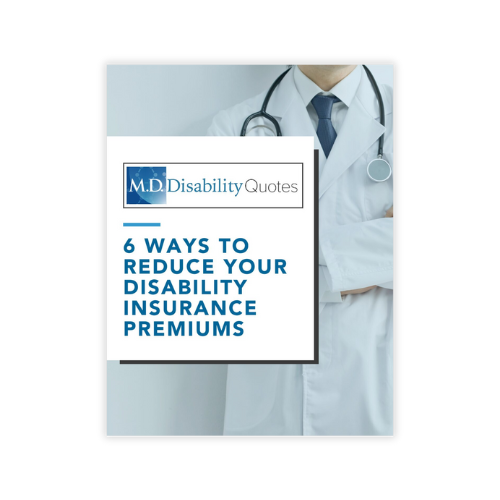Find the right plan for you
Disability Insurance Guide for Physicians 2024
What You Need To Know About Private Disability Insurance in 2024
Discover the fundamentals of long-term disability insurance and its significance in 2024 with these simple steps! Acquire solutions to transfer risk from you and your families while selecting the appropriate plan that suits your needs and compensation as it changes throughout your career. Learn all about private disability insurance and its benefits here. We can help you learn how to protect your greatest asset, by working with our team of independent brokers.
What is Disability Insurance?
Disability Insurance helps protect you financially in the event of an accident, illness, or injury that leaves you unable to work. It provides you with a monthly benefit – disability income payment; if you have suffered a disabling event. Think of disability income insurance as protection for your paycheck.
It’s important to understand the different types of disability policies available and the coverage they offer in order to make sure you have the right protection for your needs. As a team of independent brokers, we are here to help!

Did you know?
1 in 4
90%
7 in 10
Types of Disability Insurance
Short-Term Disability Insurance
You can get a plan through your employer or on your own. If you have an option through your employer it may be employer sponsored or may have a voluntary cost to you. Often, this is the most cost-effective way to purchase one of these plans and this generally gives a female some pregnancy coverage. However, these plans often fall into the “Modified Own Occupation” contract definitions so although you cannot change this, it is always a good rule of thumb to get a copy of the contract for peace of mind.
Please note: Traditionally, most Long-Term Disability carriers do not allow for any complications of pregnancy coverage unless you have met your waiting periods. If you have a pregnancy exclusion on your contract, that would eliminate any option to have complications coverage.*
Long-Term Disability Insurance
Higher than you probably think, according to The International Council of Disability Awareness and the Council for Disability Awareness (CDA). You can ignore the problem, but it’s hard to ignore the facts:
- Just over 1 in 4 of today’s 20 year-olds will become disabled before they retire.
- Freak accidents are NOT usually the culprit. Back injuries, cancer, heart disease and other illnesses cause the majority of long-term absences.
Benefit Terms
This is the amount of time that you would receive the amount of coverage. The traditional gterm of coverage has been coverage through age 65. Some carriers offer coverage through age 67, and 70 and these ranges are becoming more popular as we live longer. These terms are typically set up to last longer than what you would purchase on a business disability policy, as those policies are set up to allow a business owner to recover and get back to work. If that isn’t possible, this time frame will allow time to find a replacement and/or to sell a practice.
What is Own Occupation?
Own Occupation offers the most protection for a medical professional. You will need to purchase this rider in order to have the ability to double dip between income and a disability benefit, if disabled.
Do You Need A Residual Rider and Which Type is Best for You?
What is a Future Purchase Option?
How do you pick a plan?
1
2
Select definition of coverage – pure own occupation, modified own occupation, transitional occupation or own occupation not engaged.
3

Doctor Disability Insurance
Understand the importance of having comprehensive disability coverage for your specialty. Get the information you need now about disability insurance for medical professionals and protect your income today!
Long-Term Disability Insurance provides you and your family with income should you become unable to work due to an illness or injury. However, Long-Term Disability Insurance is one of the most complex and misunderstood insurance products there is.
Doctor Disability Insurance, otherwise knows as “Specialty Specific” Disability Insurance is important to protect you and your family should you become disabled from an accident or illness.
It protects the income you have worked so hard over the years to earn. Doctor Disability Insurance contracts vary greatly, and it is extremely important to have a contract that protects you not only as a physician, but also in your specific medical specialty.
After years of education and training, you want a contract for doctor disability insurance that will pay you when you can no longer perform the duties of a physician in your unique and specific specialty. You do not want a contract that can force you into some other occupation. Own occupation disability insurance coverage is critical for a physician. Insert video link here
Let us help make sure you are acquiring the right type of doctor disability insurance coverage to cover you in your specialty!
When evaluating your options, the amount of coverage you need depends on a variety of factors including your income level and expenses. While it can be tempting to purchase a policy with the minimum coverage, you may find that a higher amount of coverage gives you more peace of mind and better financial protection in the event that you are unable to work for an extended period due to illness or injury.
Whether you are in training or an attending, we can help you determine how much you are eligible for.
Individual Disability policies are generally contain the strongest provisions and definitions of disability to protect a physician, surgeon, dentist and/or any other medical professional.
You can apply for a private plan and during the underwriting process, you will be evaluated based upon your medical history.
Since Group Policies through an employer and contain the same provisions for all employees in a company; regardless of the income level. They usually offer only a 1-3 year rate guarantee and contain many modifications or reductions to benefits, depending on whether or not you are disabled and working or disabled and receiving any other income source. You may have to apply for these benefits and be subject to medical underwriting, but usually these are automatic during employee enrollment windows.
Please note potential red flags in these policies:
Majority of these plans have benefit offsets where the benefits to be received will be reduced by other sources like gainful employment (earned income), but also Social Security Disability, Workman’s Comp, and/or No-Fault Settlements. Once the benefit to be paid out is determined, these benefits are generally taxed too; so if you are eligible, your take home disability amount will be reduced. This may be about 25-40% less than what you were expecting to receive.
You may also find Association Policies are available through your memberships. Gaining access through a membership allows for similar rules that are offered inside of a group contract. These contracts can contain modifications that can affect your benefits paid, depending on whether you are disabled and working.
They will adjust rates at certain ages and/or require you to be totally disabled first, before paying any residual disability benefits. You have to apply and be subject to medical underwriting at the time of application but the financial underwriting typically takes place at claim time. This is why on all of the certificates of coverage, they will say your benefits are payable up to $X per month. Most of these plans will have fine print stating that the max benefit between these plans and all other plans can not exceed $15-$20,000 per month.
The other issue of concern is that when you purchase one of the group plans, it might inadvertently cancel any employer provided benefits, so please check your employer income “Benefit Offsets” section to see if they say anything about other ‘group or association based plans’ reducing coverage.
To determine the best disability income coverage for you, it is essential to consider various factors such as the length of your policy, the type of policy, waiting periods, benefit caps and other features.
Additionally, you should carefully compare all of your options in order to make sure you are receiving comprehensive coverage that meets your individual needs. It is important to choose a plan with a provider that has good customer service and a guaranteed-renewable policy so that you know your protection will last for as long as necessary.
Residual Disability Benefits If you are disabled but able to work, but in a lesser capacity therefore your income is reduced; your residual rider can help to make up the difference in income. This feature is standard in some policies or can be added as an optional rider on others.
Basic Residual
Some carriers offer only this version depending on the contract type you select. This will not include any recovery features that you see in the next definition below. You can receive benefits if you suffer a loss of income of 15-20% or more. If a carrier offers you both options, this version is the least expensive.
Enhanced Residual/Extended Residual
Even after you fully recover and return to work full time, they will continue to pay you benefits, as long as you have a loss of 15-20% of your prior income and the loss is solely the result of the injury or sickness that caused the disability. 2.
Purchase Increase Options
If your income permits you to buy more coverage, having this on your contract allows for you to buy more coverage, without having to take another application or prove medical history. This rider protects you from being declined for more coverage, if you develop adverse medical history after placing your coverage in active status. In addition, with some carriers, it controls the language/features of all future additions and it locks in the rate structure that was there, when the original policy was purchased.
Future Increase Options
This is an optional feature that allows an insured to purchase additional amounts of disability insurance in the future; with a requirement to provide financial documentation to support the additional coverage, but no medical underwriting would be required at this time. This is offered each year, within months of your policy anniversary and has a built-in cost to the rates if selected. As this feature is used (because you bought more base benefit), the cost for this feature goes away, so the initial policy costs go down upon acceptance of the increased amount. b.
Benefit Purchase Riders/Benefit Updates
This is a feature that allows an insured to purchase additional amounts of disability insurance in the future; with a requirement to provide financial documentation to support the additional coverage, but no medical underwriting at that time. However, you must follow a 3-year schedule for these increases as well as other requirements on your 3-year policy anniversaries. This increase option window is offered every 3-years and is a free feature on the contract. The insured must check in with the insurance company within months of the policy anniversary or their rider will be forfeited.
Please note: additional rules do apply under this provision. Also, there are two accelerators that should allow for an early increase under these contacts: 1) 20% increase of income or 2) loss of group disability benefits.
Cost of Living Adjustment Rider (COLA)
This feature increases the benefit payouts by a specific percentage cap, after each year of disability; starting at month 13 of claim. This does not grow the benefits while healthy and actively working. This feature only affects the policy 13 months after the point of illness or injury, not from the point of policy acquisition. 4.
Catastrophic Coverage (CAT)
This features provides extra coverage, on top of your base benefit, if you trigger the rider. The triggers generally work in these circumstances: When two or more activities of daily living are affected, someone suffers cognitive impairment or an irrecoverable disability. It is not common that these benefits are triggered but it is certainly inexpensive to add this coverage.
A Doctor Disability Plan provides you with income protection and peace of mind in the event that an illness or injury keeps you from working. Depending on the plan, benefits can include monthly income to cover lost wages and payments for medical expenses such as ambulance rides and necessary medications. The plan may also offer other helpful benefits such as life insurance coverage, educational assistance, retirement protection, short-term disability protection, and additional living expense allowance.
Types of Disability Contracts
Doctor disability insurance is important for physicians to have as it provides financial security in the event of an injury or illness that prevents them from continuing to practice in your specialty. This coverage can help protect doctors against the financial losses they may suffer if they experience a prolonged disability that renders them unable to work.
Business Overhead Disability Insurance
Don’t let disability stand in the way of your financial success. Understand how a BOE insurance policy can keep your company running strong. Business overhead disability (BOE) insurance can be a great asset to have if you’re a business owner and become disabled due to an injury or illness as the base benefits can cover your practice’s expenses.
Business Overhead Disability Insurance contracts protect you by paying the business expenses of your practice when you are not able to earn income due to your disability. Business overhead disability insurance typically covers the day-to-day expenses of running your business, such as rent or mortgage payments, utility bills, payroll, loan payments, taxes, and other costs like malpractice insurance. Additionally, some BOE policies cover administrative services for tasks like accounting and bookkeeping to keep your company running while you’re away. Different policies may offer additional coverage tailored to the specific needs of your business.
It depends. Will your landlord let you out of the lease? Is it easier to find and train good employees or just to retain them? It is important to consider these issues and determine if a Business Overhead contract is right for you and your practice.
When deciding how much coverage to buy, it’s important to know what your total expenses are and what your goals may be if you become disabled. Would you want someone to run the practice for you, or are you the brand and the reason people come to receive medical care? This can vary depending on specialty type and how subspecialized you are.
Business overhead disability insurance covers some of the typical costs associated with running a business, such as rent/mortgage payments, electricity and heat, payroll, professional fees and taxes. The amount of coverage you need should take into account these factors as well as your own personal overhead expenses. Generally speaking, the more comprehensive your coverage is, the more protection it provides for your business in case of an unexpected disability.
Traditional Base Benefits
Base Monthly Benefits – this amount covers your monthly expenses in the event you are disabled and cannot work.
Waiting periods – also known as an elimination period – is the amount of time that you have to wait for your plan to kick in, in most circumstances.
the Presumptive Disability Rider has specifications on ways that this waiting period may be waived. The BOE waiting periods range from 30-90 days on a BOE policy. This is different from individual disability insurance as the most common waiting periods are 90-180-day waits.
Benefit Terms
This is the amount of time that you would receive the amount of coverage. This is shorter than a traditional private, individual plan as this is allowing time for you to recover and get back to work. If that isn’t possible, this time frame will allow for you to find a replacement and/or to sell a practice.
Typical Optional Riders
Residual riders – these partial disability payouts are designed to reimburse for a portion of business expenses when residually disabled.
Future Purchase Option – Permits the insured to purchase additional coverage on each anniversary through age with financial evidence of insurability. Guarantees the rate structure and occupational classification of original contract.
Business Loan Riders – Reimburses principal and interest for the duration of a business loan while totally disabled. These are very popular for business owners that are newly purchasing a practice or starting one. The lenders typically want you to show capital or policies to show collateral. In lieu of capital, you may be asked to collaterally assign your disability or life policy to the bank until your terms of the financing are completed. We can help with that.
Substitute Salary Expense – Reimburses the expense incurred to employ another person to perform the duties the disabled insured would otherwise perform if not disabled. Payable in addition to the maximum monthly benefit for total disability, for up to 6 months.
Don't leave your financial future to chance
Disability Buyout Insurance
How Disability Buyout Insurance Can Help Your Practice in 2024
As a physician, you know that life is unpredictable. You never know when illness or injury can leave you unable to practice medicine and earn an income. That’s why Disability Buyout Insurance is essential for any physician looking to protect their practice and income in the event of disability. Let’s take a look at what disability buyout insurance is, how it works and why it’s important for your practice.
Disability Buyout is one of the most underutilized physician disability insurance contracts in the marketplace. Disability Buyout Insurance (also called key-person insurance) is a type of insurance policy that pays out in the event of a disabling injury or illness.
If you are in a partnership with another person and either of you becomes disabled, what happens to the practice? What happens to the profits? Does your overall agreement speak to profits being shared? If so, you could still be responsible to pay out a portion of the profits to a partner who is not working.
Do you need Disability Buyout Insurance?
Key Man Disability Insurance
Key man disability insurance is a type of business interruption insurance designed to safeguard your practice from financial losses if a key employee becomes disabled and can no longer work.
Key Person Disability Insurance allows for the practice to place a contract on a key employee that would pay a benefit to the company if that key employee was unable to do their job due to a disability.
It covers any lost revenue due to the absence of the disabled employee, as well as costs associated with finding and training a replacement for them. In order for an employee to qualify for coverage under this type of policy, they must be considered “essential” or “key” personnel within the organization—hence the name “key man” disability insurance.
Do you have another physician or PA who works for you? Are they critical to the success and profitability of your practice? Does having them there allow you to take more time to focus on the growth of your practice or to simply work less? If so, you should consider a key person contract on them. The practice is free to use that monthly benefit for whatever the practice feels is necessary, whether that is paying the monthly bills, hiring a locum, use as a recruiting bonus or incentive, you decide.
Don't let a disability leave you financially vulnerable
Disability Insurance FAQ's
These are amendments that state certain coverage would be off limits to you in the future, depending on your medical history before taking the application. If you want to determine if you are going to have a medical exclusion, starting with a pre-screen is always a good idea. Females can face other hurdles and to learn more about what is considered during the underwriting process as a female, please get more information here.
Deciding how much coverage to get with disability insurance can be tricky and it depends on where you may be at in your career and if your employer covers automatically through your employer benefits. Income is your most valuable asset and in general, you can insure up to 50-60% of your income; all depending on base and bonuses. Do you need to find out how much you qualify for? Find out here.
Everyone’s situation is different, but generally speaking, you should consider a monthly benefit that covers your monthly living expenses. For many, that amount is the same as their monthly take-home pay, generally 60–70% of their gross monthly income.
- Residual Disability Riders
- Automatic Increase Riders
- Future Purchase Options
- Cost of Living Adjustment Rider
- Catastrophic Disability Rider
- Student Loan Repayment Riders
Provisions such as length of contract – Benefit Periods – as well as your waiting period can affect the costs. Waiting periods as also known as Elimination Periods. To determine ways to save in costs on your Disability Insurance contract on a new or old contract, please check out our Physician White Paper Here.
You may hear different terms for types of premiums. What are the differences between Fixed/Level Insurance Premiums and Graded/Increasing Premiums? Typically, most want a fixed amount that will be “rate locked” but not all clients are the same. We can walk you through how these work if you are needing to keep the costs lower for an initial period of time. Think of level = as a fixed “rate” lock, whereas graded or graduated means that it will follow a schedule of changes over time.
If you are a physician or other medical professional, your most valuable financial asset is your ability to earn an income. Protecting that asset is vitally important to the financial stability of you and your family. “Specialty Specific” Disability Insurance (link an own occupation video here) can help ensure financial security and peace-of-mind in the event of illness or injury, such as:
- Traumatic Brain Injury
- Cancer
- Fractures
- Heart Attack
- Stroke
An unexpected illness or injury could temporarily or permanently disable you and prevent you from working in the profession you chose. A physician disability insurance contract that protects you in your own specialty is vitally important. Not all policies do this!
Our experience and knowledge of Doctor Disability Insurance contracts is unmatched in the industry. We will help you understand the various policy options and features and help you choose the best policy that will protect your income in your specific specialty, whatever and however specific that specialty is.
Most people don’t think that a disabling event will happen to them. In addition, many people think that their employer-based disability plan will be enough and majority of people rely on what their HR Department reports to them about proper coverage.
If you are unsure of what you have through your employer, please contact your HR for additional benefits. Give us a call and we will be happy to review those benefits with you.
What is your most valuable financial asset and are you protecting it? It’s not your House or Car which you insure? And it’s probably not your investments or any other asset you own. Your most important financial asset is YOU and your ability to earn income. Think of yourself as the goose that lays the golden eggs. The golden eggs are the houses, cars, and other things you accumulate. You protect those eggs and you insure them. However, without the goose there would be no golden eggs. Therefore, the most important item to insure is the goose that produces those eggs. That’s what disability insurance does, it insures your most important asset, YOU!
What is the financial value of you and your ability to earn an income? Most people are surprised to learn how much income they stand to earn over their working years. The following chart illustrates the cumulative income potential over a physician’s career at varying ages.
– A physician Earning $300,000 annually who becomes permanently disabled at age 40 could lose $7,500,000 of earned income through retirement age 65.
– A physician Earning $500,000 annually who becomes permanently disabled at age 45 could lose $10,000,000 of earned income through retirement age 65.
The amount of disability insurance you need is based on your personal situation. This table represents the maximum amount you may qualify for given your annual earned income.

* Monthly Maximum Benefit for Individually Owned Policy Paid for with after tax Income.
** Monthly Maximum Benefit for Individually Owned / after tax paid Policy combined with an existing Group Policy.
OWN SPECIALTY DISABILITY INSURANCE SAMPLE RATES
$10,000 Monthly Benefit Sample Monthly Rates
These are sample physician disability insurance rates. Rates are based on age, gender, medical specialty, state of residence, health history, and available discounts. For a customized quote based on your unique information, please complete our quote request page.

Whether you are looking for own-occupation disability insurance to protect your income or long-term business disability insurance to protect your assets and practice, there are good reasons to turn to M.D. Disability Quotes.
M.D. Disability Quotes works with all of the major carriers that offer own-specialty disability insurance for physicians. Our long-term relationships with each of these carriers and underwriting departments greatly benefit our physician clients.
We offer the opportunity to purchase a disability contract with a minimum 15% discount off the retail rate. We will also be there for you for the life of the policy.
M.D. Disability Quotes offers physicians nationwide the opportunity to purchase a disability contract with a minimum 15% discount off the retail rate. We will be there for you every step of the way – not just during the application process, but for the life of your policy. Our ongoing policy services will keep you updated on changes in the disability insurance market and how those changes could affect you. We will notify you whenever you qualify for additional coverage through your policy.
All of the carriers that we represent will typically be 100 years old or older, have at least $5 billion in assets and be A-rated or better with A.M. Best, the primary insurance company rating service. Our contracts typically offer the following options: Residual Benefits, Cost of Living Adjustments (COLA), Catastrophic Disability Benefits, Future Purchase Options (FPO), Non-disabling Benefits, Good Health Benefits, and Recovery Benefits.
Disability Insurance Resources
Related Posts
Related Videos









